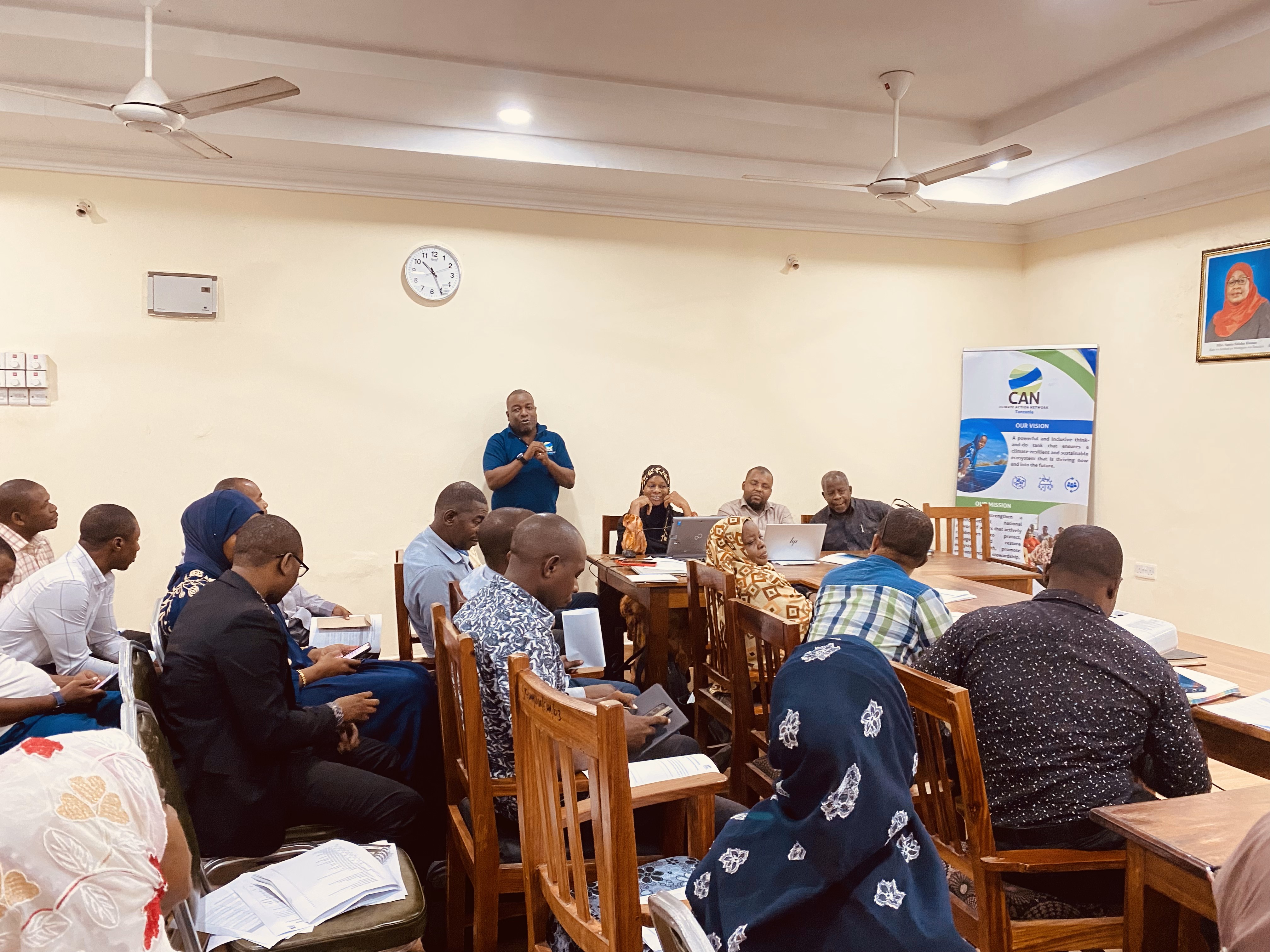
Published: APRIL 08, 2024
In a historical partnership that aimed at safeguarding Zanzibar's environment, the Office of the First Vice President of the Revolutionary Government of Zanzibar (FVPO-RGoZ) and CAN Tanzania, a think-and-do-tank, not-for-profit and non-governmental organization, came together to review the Zanzibar Environmental Policy (2013). BfdW has offered financial support for this process. The financial support aims at supporting an inclusive and participatory process from both state and non-state actors to ensure the integration of contributions from local actors for a climate-resilient society in Zanzibar.
Through this partnership, the two institutions are driving a comprehensive review of the Zanzibar Environmental Policy (2013), with stakeholders being at the forefront of the whole process to ensure the reviewed policy aligns with current challenges, advances, and needs, to safeguard Zanzibar ecosystems for generations to come.
On 28th and 30th March the policy review Task Force Team (TFT) which comprised of representatives from CAN Tanzania and RGoZ conducted stakeholders’ consultation workshops in Unguja and Pemba respectively.
Opening the stakeholders’ workshop in Unguja, the Principal Secretary in the First Vice President's Office, Dr. Omar D. Shajak said: “By actively seeking input from a diverse range of voices, including government officials, environmental NGOs, FBOs, CSOs and community representatives, the Government is committed to crafting a comprehensive environmental policy framework that will ensure all necessary groups are actively involved in the process to provide a policy that will reflect the specific needs and priorities of Zanzibar's unique environment and people.”
The workshops in Unguja and Pemba provided a valuable platform for open and constructive dialogues on the reviewed policy draft. Participants had the opportunity to delve into the specifics of the proposed measures, offering valuable feedback and suggesting improvements. This inclusive approach ensures that the final policy is not simply top-down legislation but rather a collaborative effort that incorporates the knowledge and concerns of communities most impacted by climate change effects.
The review of the Zanzibar Environmental Policy comes in ample time after 10+ years of implementing the 2013 policy. This gives room to highlight the successes and challenges raised by the outgoing policy and integrate the new measures, innovations and technologies in safeguarding Zanzibar Environment. The new measures, innovations and technologies are anticipated to build the resilience of the local actors by strengthening political frameworks on climate change and the environment. The frameworks provide the necessary structure and guidelines for addressing environmental conservation.
Through this partnership, the two institutions are driving a comprehensive review of the Zanzibar Environmental Policy (2013), with stakeholders being at the forefront of the whole process to ensure the reviewed policy aligns with current challenges, advances, and needs, to safeguard Zanzibar ecosystems for generations to come.
On 28th and 30th March the policy review Task Force Team (TFT) which comprised of representatives from CAN Tanzania and RGoZ conducted stakeholders’ consultation workshops in Unguja and Pemba respectively.
Opening the stakeholders’ workshop in Unguja, the Principal Secretary in the First Vice President's Office, Dr. Omar D. Shajak said: “By actively seeking input from a diverse range of voices, including government officials, environmental NGOs, FBOs, CSOs and community representatives, the Government is committed to crafting a comprehensive environmental policy framework that will ensure all necessary groups are actively involved in the process to provide a policy that will reflect the specific needs and priorities of Zanzibar's unique environment and people.”
The workshops in Unguja and Pemba provided a valuable platform for open and constructive dialogues on the reviewed policy draft. Participants had the opportunity to delve into the specifics of the proposed measures, offering valuable feedback and suggesting improvements. This inclusive approach ensures that the final policy is not simply top-down legislation but rather a collaborative effort that incorporates the knowledge and concerns of communities most impacted by climate change effects.
The review of the Zanzibar Environmental Policy comes in ample time after 10+ years of implementing the 2013 policy. This gives room to highlight the successes and challenges raised by the outgoing policy and integrate the new measures, innovations and technologies in safeguarding Zanzibar Environment. The new measures, innovations and technologies are anticipated to build the resilience of the local actors by strengthening political frameworks on climate change and the environment. The frameworks provide the necessary structure and guidelines for addressing environmental conservation.
